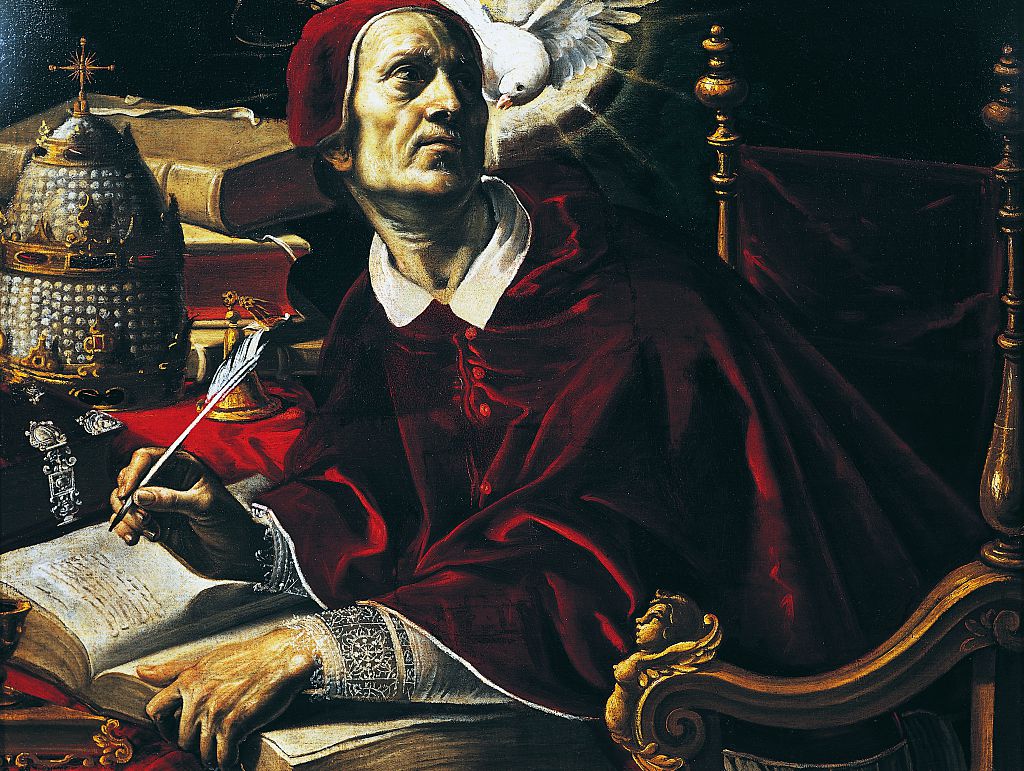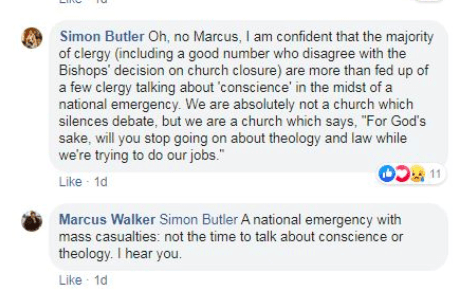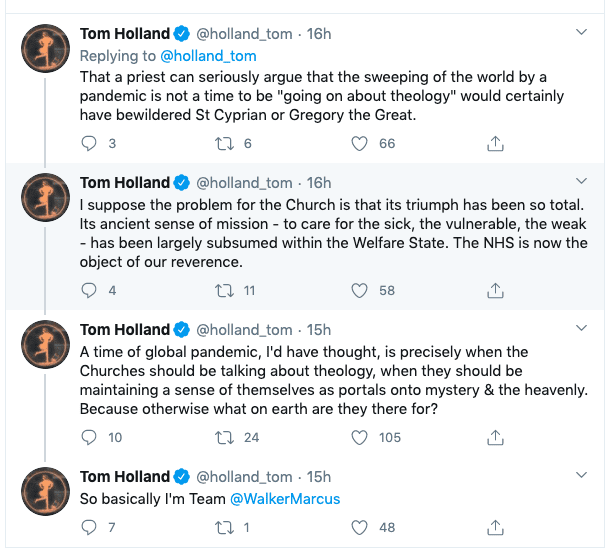What Good Is Theology In A Time Like This?

In Britain, the Church of England bishops went beyond what the government required, closing their churches not only to the faithful, but also to their own priests, out of what appears to be a misguided attempt at solidarity. This means that weirdly, the priests could not offer the liturgy for believers watching by livestream. The Rev. Marcus Walker, an Anglican priest at the oldest standing church in London, finally had enough of that. In his comeback sermon, he said:
And so we’re back.
Back here in this ancient church after an exile of three weeks.
It’s worth saying a few words, now, on why we’re back.
The Archbishop of Canterbury and the other Bishops of the Church of England issued a letter, almost a month ago, declaring that churches must shut for congregations – quite rightly, and in accordance with Government guidelines – and for clergy, even for broadcasting from their churches – an activity explicitly permitted within the Government’s guidelines.
After a considerable amount of uproar, on Easter Day the Archbishop of Canterbury clarified that these were guidelines and not instructions, nonetheless using the power and strength of his position to argue in favour of his guidelines.
As the Incumbent of this church, who, with the Parochial Church Council of this church, has the only legal authority to end worship here, I have taken the Archbishops’ guidelines very seriously. I have thought and prayed on them, and listened too to the voices of my flock, of my parishioners, among whom I have been sent to serve and the care – the cure – of whose souls I have been entrusted by the Bishop, with the Bishop.
Their voices have been loud, insistent, and – so far – unanimous. I have received scores of letters and emails, calling on services to be restored here in their church: the church they have upheld and kept up, where they were married, where they buried a partner, saw a child christened, found God, were confirmed.
This is their church and I am their pastor; I owe them my solidarity.
As one said in her letter: “We don’t need you in solidarity at home, we need you in solidarity at the altar of our church.”
And so here I am…
That caused a big social media squabble. Here is an exchange between Canon Simon Butler of the C of E, and the Rev. Walker:

Pow! A TKO for Father Walker! The British historian Tom Holland takes the correct measure of this exchange:
Fascinating how the secularism bred of Christian theology & history now seems to be cannibalising the Church itself. It’s the traditional understanding of its purpose – as a portal onto mystery, an interface with the supernatural – that’s on the defensive. https://t.co/a7sdcf4LJS
— Tom Holland (@holland_tom) April 22, 2020

These exchanges raise a fascinating topic: In a global pandemic, what are churches for?
Let’s talk about that. Here’s what I don’t want to talk about: whether it was the right call for governments or church hierarchies to stop having services that include the public. That is a policy decision that, in fairness, is not unrelated to the question, but that is not really what I’m getting at here. I agree with the Rev. Walker that churches ought to be open for priests to conduct services, and I would even say that churches (Anglican, Catholic, Orthodox, etc.) should be open for private prayer, if the individual church has the means to provide staff to make sure the faithful are maintaining proper social distance. What I want to talk about here is the point Tom Holland makes, about the unique value of the church in a time like this. Connected to that point is what one thinks the church is for during normal times.
Based on what I see here, Canon Butler seems to think that the main purpose of a church is to do good works. (I ask forgiveness if this is not what he really believes; I’m just quoting his social media for the sake of argument.) It is indisputable that that is one purpose of a Christian church. We know from history that the Christians of the early church period distinguished themselves in the eyes of some Romans by caring for those sick and dying from plague, instead of running away. Actually, Tom Holland tells this story in his wonderful book Dominion, and he also tells how St. Basil the Great founded the world’s first hospital.
But as Holland also tells in that same history of Christianity and its role in forming Western societies, many of the social welfare functions performed by churches were eventually taken up by the state. There is still a charitable, social-work role for churches, and most perform that role. But no one in the modern world looks exclusively to the churches to do that work.
For all the health-care good that hospitals and other secular institutions do, they do not, and cannot, provide a sense of mystery and meaning to people enduring this global calamity. Churches can, and should. Holland mentions Gregory the Great. Just last night, I was perusing The Fate Of Rome: Climate, Disease, & the End Of An Empire, a book by Oklahoma University historian Kyle Harper. In it, Harper discusses the role of these natural phenomena, in particular plague and the Late Antique Little Ice Age, in weakening the Empire in the West, and hastening its decline. I had not ever given serious consideration to these factors, to be honest. I found it so interesting that I reached out to Prof. Harper for an interview; we will be talking tomorrow, and I’ll report back in this space.
Anyway, Harper writes about Gregory the Great, the Roman pope from 590 to 604. I know Gregory primarily as the author of the only hagiography we have of St. Benedict of Nursia, who died in 547. For his work, Gregory interviewed monks who knew the saint personally. In his own history, Harper talks about how Gregory led the Western church through a period of great turmoil and suffering from the plague.
Gregory was made pope in 590, following a year of catastrophic floods in Rome, and another outbreak of plague. In addition to organizing relief work, Pope Gregory’s acts included public prayers. Harper writes, “The incipient plague called forth an energetic liturgical response. Gregory instituted elaborate ritual processions — mournful prayer parades known as rogations — to stay the ravages of the pestilence.”
They didn’t work, says Harper, or if they did, their success was only short-lived. We know from Gregory’s writings that he was almost overwhelmed by the natural disasters, and speculated that the end of the world was at hand. Writes Harper, “Gregory’s life spanned an age of climatic deterioration on a par with anything in the late Holocene.”
If a pope, or any religious leader, cannot be counted on to stop natural disaster by his prayers and liturgies, what good is he — or, to be precise, what good are prayers and liturgies? What good is theology at a time like this?
I can think of a couple of answers that should make sense to someone who is not a believer. I’ll stipulate that I believe very much in the efficacy of prayer, but that prayer is not a magical incantation meant to subdue the natural world to the will of the pray-er.
The Chartres cathedral, built in the high Middle Ages, is meant to be a representation of the cosmos entire. In a similar way, liturgies and ritual prayers order experience, and remind us that there is metaphysical meaning woven into the fabric of the natural world. It is not necessarily for popes and priests to tell us that God allowed this flood, this famine, this plague, to fall upon us for this or that reason. But it is their role to remind us, through their preaching and their processions, of God’s presence. In a time of grave natural disorder, the work of God, and the manifestation of His loving presence, continues.
If you aren’t a believer, you will probably see this kind of thing as deception, or self-deception. But people who are suffering, both individually and collectively, need something beyond what rationality can provide, to help them go on. A few days after 9/11, my uncle, a Lutheran pastor on the scene at Ground Zero with the FBI, phoned me and told me that a construction worker had just discover some crossbeams that had embedded itself in the ruins in such a way as to resemble a cross on Calvary. I was a columnist at the New York Post, which is why my uncle called. He told me construction workers on the site, digging for bodies in the twisted metal, were going over to the cross to pray. I went over to Ground Zero and got an interview with a mountain of a man, the construction worker who found the cross. He came off the site and, filthy and stinking of burned debris, he told me how he had led a fire captain whose son had perished in the collapse over to the cross, and they prayed together. You can say that desperate people faced with the overwhelming horror of Ground Zero imposed meaning on a crossbeam that fell in a just-so way — and you might be right. But you would not have had the arrogance to say that down at Ground Zero, to men who were living through that hell. To them, they didn’t expect God to tell them why it happened; it was enough that they believed they had been given a sign that God is with them. It allowed them to carry on with their important work, despite everything.
This is what theology and ritual can do.
Second, through their theological teaching, the clergy help us come to terms with suffering and death. As far as I know, nobody has ever come up with a satisfying theodicy — that is, a good reason why an all-good and all-powerful God allows evil and suffering. Oh, there are theodicies that make logical sense, but no syllogism will persuade a mother mourning her dead child that what happened to him was just. Mary, the Mother of God, lived this out in her own life, and in the death of her Son. But her Son was raised from the dead, and trampled down death. It is the role of priests and pastors to explain this, and the reason for our hope in the face of the great mystery of suffering and evil. You cannot ever really know, in the intellectual sense, why these things happen, but through faith, you can enter into the mystery, and live the mystery.
You know who else helps humans come to terms with suffering and death? Philosophers, poets, and artists. I find it hard to imagine that Canon Butler would tell philosophers, poets, and artists to stand down in a time of global pandemic. True, they will have to do their work behind closed doors, but the calling of priests, who teach theology by word and ritual deed, must be done in public, though certainly it is fair that their work be limited by public health restrictions.
The church has both a social-worker role, and a sacramental role. In the sense I mean, the latter statement is true even for churches that don’t have sacraments; the church’s ministers have a special calling to announce God’s presence, and draw us nearer to Him at all times, especially amid crisis. It is an impoverished understanding of the church and the role of her ministers to think that they have no business talking about theology at a time of mass sickness and death. That is precisely what they should be doing! Again, I think it is perfectly reasonable and just for governments and bishops to stop public gatherings for worship until the plague has passed, but it is not right to silence clergy and cut them off from their rituals, especially if the rituals can be broadcast to the faithful. A church that is deemed useless in an emergency time like this is also useless in normal time. That is something that this apocalypse is unveiling, and not just for Anglicans.
Subscribe for as little as $5/mo to start commenting on Rod’s blog.